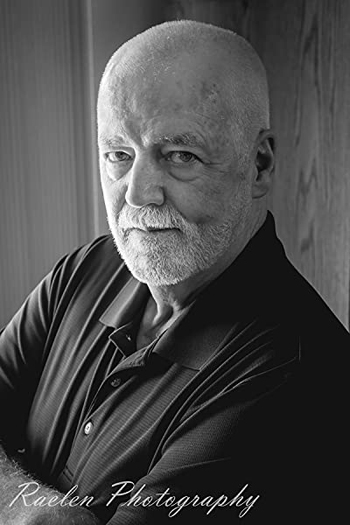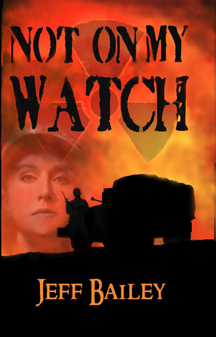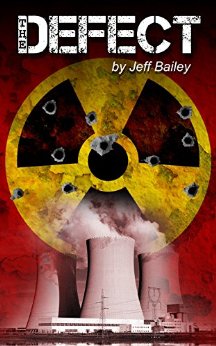 |
||||
 |
||||
 |
||||
 |
|||
 |
|||
 |
||||
 |
||||
Interview with Jeff Bailey

Bio
I write nuclear conspiracy thrillers novels for a reason. I worked in nuclear related technologies for 45 years. My first U.S. Army assignment at nineteen years old was to repair and maintain nuclear weapons. In 2012, I retired from the science staff of a national laboratory. In the years in between, I built, initially started, or operated a variety of nuclear power and research reactors.
While I infuse my nuclear resume into my stories, I base the stories themselves on true events from everyday news items. I based my recent fiction release, The Defect, on the actual events surrounding the meltdown and destruction of the Three Mile Island Nuclear Power Station and on the lone gunman attack on Watts Barr Nuclear Power Station. The Wikipedia account of Three Mile Island says that the failure of an air pilot valve contributed to the accident. In The Defect, the defective air pilot valve is the hero.
Welcome to my world.
Interview
Tell us about yourself. Where are you from?
I was born in San Bernardino, California, and raised all over the state. My father worked for the state, so we moved fairly often. I write action/thrillers with a nuclear theme for a reason. I worked in nuclear-related technologies of one description or another for 45 years. In 1967, my first assignment for the U.S. Army at 19 years old was to repair and maintain a portion of the nation's nuclear weapons arsenal. By 1970, I was operating U.S. Army nuclear nuclear reactors. Jump forward 42 years, in 2012, I retired from the science staff of a national laboratory. In the years between, I built, initially started, or operated a variety of nuclear power and research reactors around the world.
While I heavily infuse my nuclear resume into my stories, I base the stories themselves on true events from everyday news items. I based my first fiction release, The Defect, on the actual events surrounding the meltdown and destruction of the Three Mile Island Nuclear Power Station in Pennsylvania and on the lone gunman attack on Watts Barr Nuclear Power Station in Tennessee. The Wikipedia account of Three Mile Island says that the failure of an air pilot valve contributed to the accident. In The Defect, the defective air pilot valve is the hero.
What first got you into writing?
When I retired in 2012, my mind was far too active to just sit in a rocker and waste away. I've always loved telling stories and thought I might have some entertaining stories to tell. Six months later, I had my first 12 stories spreadsheeted (spreadsheeted, not outlined, retired scientist).
I know you write fiction, have you ever thought about writing a nonfiction book? Why or why not?
Easy answer. I write for fun. For me, there is no fun in nonfiction.
What are your writing goals?
I write for fun and enjoy entertaining people, but (tongue in cheek) I have to admit that I would like to make the NYT Best Seller List on the same day that everyone in my network makes the NYT Best Seller List: someday.
What is one of the things you are most thankful for as a writer?
I'm a retired scientist, writing has given me something to do with my time (boy, has it) and I most like meeting all the people that I've come to know. I find people fascinating, an ever-shifting canvas.
What's the most interesting book you've ever read?
For pure "interesting to read," probably all of James Mitchener's books. I do enjoy reading and usually find something a little different to like about every book that I read. I have found a few books, however, that I just can't establish a connection with long enough to finish. Of course, no one will ever hear of them from me.
What book are you currently reading?
That answer changes quickly. I read a book, sometimes two, a week. Right now, I'm reading Brian Vannoy's Falling Toward Redemption. I just finished L.A. Starks's book, The Second Law (great conspiracy thriller), and Kerry Kennedy's children's book, Boris Flies To The Moon. I post all my reviews on GoodReads. Look up my profile and you'll find a listing of my last 100 reviews.
Who are your favorite authors?
All-time favorite is Ayn Rand (Atlas Shrugged, Fountain Head). Modern Mitchener and Steven King. Best single book that I've read in the last five years has to be Mark Tedesco's A Dog On The Acropolis.
What would your 8-year-old self think and say about you today?
My 8-year-old self wanted to be a baseball player. My 8-year-old self never thought he would be a soldier, engineer, or scientist.
What do you like to do when you are not writing?
I read and review a lot. But, my wife and I share a big house with my granddaughter, her husband, and a 6-year-old grandson. Guess who takes up most of G-Pa's time?
Tell us about your latest book. What do you hope readers take away from it?
I just want my readers (and future watchers of the movies made based on my books) to be entertained. No hidden agendas or causes.
Who is the perfect reader for your book? (Please do not say "everyone.")
My genre is conspiracy thrillers, for now.
What inspired the idea for the story?
Fifty years in nuclear-related industries. I do post an occasional "Back Story" on my LinkedIn and GoodReads feeds about individual story inspirations.
Give us an insight into your main character. What does he/she do that is so special?
I take my characters from real life. Brian, in my first book, The Defect, was based on me, first-time author and all. Cassie, in Not On MY Watch was based on my oldest granddaughter, who was a rescue aviation firefighter in the U.S. Marines while I was writing the book.
If your book were made into a movie, which actors would play your characters?
"Hard to tell, the future is." — Yoda.
By the time my books get made into movies, all the actors I know will probably be too old.
What is the most important thing that people do not know about your subject/genre that they need to know?
My books are all based on real-life events: Three Mile Island, my term at the national labs, the "Radioactive Boy Scout," my time in the Army nuke programs, etc. I just provide an alternate back story to the real events. If a reader were to research the core meltdown accident at Three Mile Island, for instance, they would fine that the portions of my story related to what's been released to the public follows the real-life news releases from the actual events.
Please share a short excerpt from your book.
The oldie, "Help Me, Rhonda" by the Beach Boys played from the open window of the pickup truck as it pulled into a parking spot. Brian Sing slowly rolled up the truck's windows and shut off the engine as the song ended. He stepped out of his pickup truck, turned to face the open truck door, and took a deep breath. The air was cool. He liked the springtime scent of the barrel cactus flowers carried by the late night desert air. It was 11:45PM. He was in the employee parking lot at the back of the Desert Canyons Nuclear Power Station in Southern California. He had already passed through the vehicle security gate at the front of the facility. He was inside the facility security fence. This was, for Brian, a conscious moment of transition. This was the moment when he put the rest of the world out of his mind, put on his hardhat, and started his workday. Brian was one of the Operations Shift Supervisors at Desert Canyons Nuclear Power Station. He loved this moment because it was the start of his workday at one of the most technically demanding and interesting professions on earth.
As he turned to face the facility, he began to look at the indicators of the operating conditions at the plant, taking in information. To his left, none of the cars in the parking lot belonged to upper management. To his right were the twin four hundred and ninety-nine foot water cooling towers. These towers were used to transfer waste heat from the power plant into the water in the towers and ultimately into the air above the plant. The waste heat was harmlessly carried away with the breeze as opposed to overheating the water in the nearby river. The amount of steam, coupled with the current temperature and dew point, told Sing that the power station was operating close to the full capacity of the main generator. These were both good omens for a nice, quiet shift. In a week, on May 1, the Refueling Outage would start. For weeks thereafter, there would be no 'quiet' shifts.
As Brian turned to open the door to the Turbine Building, a movement further down the building caught his eye. Someone was coming out the Maintenance Building emergency exit. While the various buildings were technically separate buildings, they were built connected to each other. The several buildings of Desert Canyons were more like several wings of one big building.There was no alarm at the emergency exit, therefore, whoever that was, had used a key card and had computer authority to open the door.
Brian stepped inside the turbine building and let the door close behind him. At the same moment, at the maintenance shop emergency exit, Alex James, alias Adawi Aimur-Noor Kuzbari (translated as the Son of the Lion) took a quick, nervous glance back at Sing. Alex was not a member of the permanent plant staff. He definitely did not belong here, especially since he was using someone else's access badge. Good, the man at the transformer yard went inside. Praise be to Allah, his luck held. It took a long moment for Alex to calm himself, to calm his fluttering heart, to clear his vision. After a few seconds he continued his walk, not to the parking lot, but to the River Water Pump House, a little more than two hundred yards away. He started his stopwatch and continued to take notes. It was fifty-five steps and thirty seconds to where the semiautomatic pistol in its vacuum-sealed, plastic bag was hidden in the rocks at the side of the road. No, Alex didn't belong here.
What role does research play in your writing? Do you have any research resources you recommend?
I only research settings. I did most of my research by living the events.
Do you aim for a set number of words/pages per day? Do you write every day, five days a week …?
I'm retired. I don't live to a schedule. I don't even know where in a book or even which book I'll be writing on a given day. I bounce around as the whim takes me. I may not even write in a novel. I may jump to the screenplay version of one of my novels. I'm doing the screenplays at the same time. Helps me to solidify the stories to have to picture them in a novel and in a movie at the same time.
Do you have an area set aside for writing?
Yes.
What does your writing process look like?
Helter-skelter. I write whichever scene most strikes my fancy at any articular time. I do keep each given novel and screenplay spreadsheeted (engineer) so I never lose track. I started Sing's Artifact five years ago by writing the opening and the ending. I haven't touched it again, yet.
Do you outline and plan your story or do you just sit down and write? Why?
When I decided to try to write a book, I spreadsheeted (not outlined) 12 stories in six months. All the unfinished books are subject to constant revision from the inspirations of everyday living.
What comes first, plot or characters? Why?
Ending. I already know the endings.
What is your most interesting writing quirk?
Can't think of one. I'm pretty boring. I guess maybe that I write with two fingers (500 words an hour). Never learned to type. These days, arthritis wouldn't let me use my whole hands, anyway.
How important are names to you in your books? Do you choose the names based on liking the way it sounds or the meaning? Do you have any name-choosing resources you recommend?
Interesting that you asked. I enjoy genealogy. A great many of my good and bad guys are named after some ancestor or another. I have yet to be able to name a character Napoleon yet. My favorite ancestor is Callum Bailey (there's a historical memoir available about his life, Callum Bailey (available from the Library of Congress). He served three terms of service during the American revolution under General George Washington.
What software do you use to write? Or do you prefer to write longhand or dictate your work? Why?
Microsoft Word, out of habit.
How long (on average) does it take you to write a book?
Book and associated screenplay, 12-18 months, if I wrote straight through.
How do you celebrate when you finish writing a book?
By marketing said book. I don't hold much to celebration or ceremony.
In your opinion, what's the measure of a successful writer?
That is for each writer to decide for himself. Makes my head hurt just thinking about it.
What is the best advice you could give other writers about writing?
Write every day. Read every day. Network every day. Market in your spare time.
What's your favorite and least favorite part of publishing?
Having the energy to disconnect from negative or destructive people. I don't have the energy to keep up with them.
How do you market or promote your books (e.g. social media, e-mail, blog tours, etc.)?
Ninety percent networking. Ten percent book signings.
What is your best marketing tip?
Market every day. Don't be afraid to try something completely outlandish.

Writing Advice: Writing a Story
Writing Advice: Choosing Your Narrative
Author Interview: Nicolas Lemieux
Author Interview: Clay Vermulm
Author Interview: Jasveer Singh Dangi
Author Interview: Rune S. Nielsen
Author Interview: Uchechi Theresa Ezeuko
Author Interview: David Andrew Trotter

